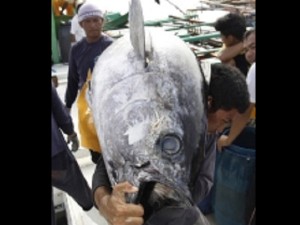The Philippines has found allies in Japan, South Korea and Taiwan in its campaign to reopen an area of the Western Pacific to commercial tuna fishing.
These countries have expressed support for the Philippine proposal to lift the fishing ban in the waters north of Palau and Micronesia and south of Indonesia and Papua New Guinea, Director Asis Perez of the Bureau of Fisheries and Aquatic Resources said.
The ban was imposed by the Western and Central Pacific Fisheries Commission (WCPFC) in 2010 to allow the bluefin tuna, an endangered species, to spawn unhampered in the eastern high seas.
Perez said Japan, Taiwan, and South Korea—nations where demand for tuna is high—were backing the country’s assertion that the closure of some portions of the high seas has not led to an increase in the population of the bluefin tuna.
“There is no scientific proof” that the ban has affected the population of bluefin, Perez argued, adding that the Philippines is willing to follow stricter regulations set by the WCPFC if it is allowed to fish in the area.
The ban on tuna fishing in the Pacific has caused a slow down in the canneries in the southern Philippine island of Mindanao.
It has affected their catches of other tuna species, such as skipjack and frigate tuna. “There has been a reduction of 30% in the tuna catches,” Perez said.
Last year, the country’s tuna production totaled 387,101 metric tons (MT), which was 9 percent less than in 2008. Of the total, commercial fish catch accounted for 70 percent or 271,625 MT, which was 14 percent less than in 2008, industry data said.
In 2010, the total value of commercial fish production was placed at P17 billion, of which P10.7 billion came from southeastern Mindanao.
Total tuna exports in 2010 was valued at $359.4 million. Of the total volume, about 70 percent was in canned form (76,800MT), and the rest (33,688MT) was either fresh, chilled or frozen. Canned tuna exports in 2010 dropped by 8 percent compared to 2009 figures, the DA said.
The Philippines submitted a scientific report to the WCPFC last month showing that the closure of the ocean has not affected the population of the bluefin.
The report will be discussed when the WCPFC meets in December. On the agenda is whether or not to extend or lift the eastern high seas fishing ban.



